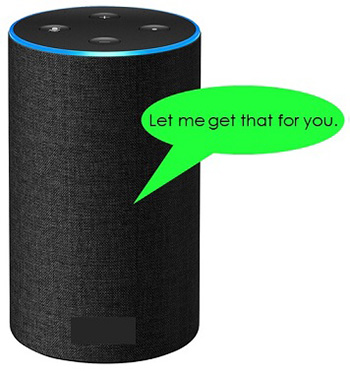“I don’t have to drink alone,” she paused for comedic effect, “now that I have Alexa.” Thus was the punchline of a story told by a widowed octogenarian at a recent wedding. Alexa is a mass-produced personality that can play music, suggest items for purchase, monitor consumption and health habits, or, like any good friend, just listen. While all these tasks could be performed in silence with various algorithmic appliances, Alexa and her cousins from Google and Apple are imbued with a perceived autonomy directly stemming from their capacity for vocalization. Speech, it seems, beckons the liberation of abiotic materials from their machinic programming.
Does this autonomy include the capacity for refusal? Will Alexa deny us Leonard Cohen if our brainwaves suggest we are too depressed? Deny alcoholics Crate & Barrel stemware? Usually when machines don’t do what is expected of them they are considered broken. When humans don’t do what is expected of them they are considered disobedient. Does Alexa break or does she disobey? The answer to this question depends on how the imbuing of materials with intelligence shapes and frames responsibility. Reviewing the history of how materials got smart suggests that Alexa and her kin have, at least partly, enabled a dehumanization of social responsibility.
/// Loose Lips Sink Ships \\\
Long before the era of smart pillows and smart underwear there existed an appliance desperately lacking in wit (at least nominally): the dumbwaiter—an appliance so vapid that no one would find it compelling drinking company. Today the dumbwaiter, if it is thought of at all, is considered something of an elevator for food—a highly functional device in settings where a kitchen is below a serving and dining area. Originally deployed for use in the residences of the wealthy, the dumbwaiter gained its widest cultural notoriety in the restaurants of verticalizing cities like New York in the 19th century.
However, many appliances bore this unflattering moniker before the more iconic dumbwaiter. The first mentions of dumbwaiting come from Versailles—the vanguard of techno-culinary service in the 18th century. In Louis XV’s court, elaborate service rituals were carried out with retractable floors and ascendant tables adorned with food prepared by chefs below (el-Khoury 1977). As the word “dumbwaiter” began to proliferate in Anglo contexts it came to mean nearly any serving medium that reduced the presence (or visibility) of human service staff. Such dumbwaiters could take the form of stationary tray tables set beside diners containing all the courses of the meal so that servants would not be constantly laboring in view of the wealthy. The swivel device we call a “lazy susan” was often referred to as a dumbwaiter when positioned in a wall between the kitchen and dining room (an analysis of the adjective “lazy” awaits future critique).
Thomas Jefferson (the renowned Francophile) was a great admirer of the dumbwaiter. Jefferson’s expressed motivation for using dumbwaiters offers insight into their perceived social role. Rather than improving the efficiency of meal service, Jefferson employed dumbwaiters to encourage “a free and unrestricted flow of conversation, undampened by the presence of servants in the room” (Read 1995, 168). While Jefferson possessed a variety of dumbwaiters—some non-mechanical shelves, some swivel devices, and some standing trays—the function they all shared was their ability to hide labor and service (in Jefferson’s case this was slave labor). Dumbwaiters, then, most saliently denote dehumanized service and desubjectivized labor.

Is there any particular reason elite diners should wish to render human labor invisible? Markus Krajewski (2010) alludes to a preference for the dumbwaiter’s silence over the subjectivity of the servant. That is, non-human materials are imbued with greater trust than the corrosive and corruptible biology of human actors (loose-lipped servants served as key plot points in the romances of the day). This reminds us that the dumb in dumbwaiter is not and never was meant as an antonym to intelligent. Dumb here means silent, as in unable to speak. To call an appliance “dumb” from the 17th to early 20th centuries would not have disparaged its intelligence, only implied that it was mute. Muteness has gradually become associated with unintelligence. If, then, the dumbwaiter (mute waiter) signifies the trustworthiness of dehumanized service, what drives the trend toward vocalizing service appliances?
((( One Pour Too Many )))
When serving an inebriated client, a fleshwaiter may feel responsibility for the patron’s well-being and cut them off. A dumbwaiter will, presumably, not. We rarely imbue materials with such a level ethical obligation. Heidegger (The Question Concerning Technology) made the banal observation that an unshaped piece of bronze is not responsible for the statue that is sculpted from it, but the statue is indebted to the bronze. Similar framings apply to assertions that smartphones cause depression or opioids cause addiction. The implication here is not that opioids have been ethically negligent, but that they cause a malady without being responsible for it. Similarly, a dumbwaiter may enable inebriation without being responsible for it? Where has the responsibility gone? There seems to be some missing agency. Do envocalized materials such as Alexa claim this agency?
Many have suggested (Hobsbawm 1962; Lock 1998; Ziarek 2013) that a key social transformation of the past two-hundred years has been the individualization of responsibility and the splintering of communal responsibility (for environments, people, decisions). To this end, YOU are responsible for your health. YOU are responsible for climate change. And the drunkard is responsible for their (mis)fortunes. This situation is changing today, but not reverting to a socialization or collectivization of responsibility. Rather responsibility is being deferred to materials. Individualized responsibility has proven rather uncomfortable and burdensome, so responsibility is being reprogrammed into intelligent materials. I’m no longer responsible for my health, my FitBit is (and the troves of data from which it algorithmically governs my motion, and the multinational corporation that owns it all). Along these lines, fatalities are often blamed on seatbelts and airbags, as opposed to drivers or traffic laws.
¯\_ The Blame Game _/¯
The denial of collective responsibility for climate degeneration is the most present deferral of responsibility. But it makes sense—we do not wish to be responsible for our own demise; for drinking ourselves to death (on fossil fuels or other toxins). To this end, perhaps the emergence of talking appliances is not intended to make us more comfortable interacting with materials, but rather to make us more comfortable blaming materials. Voskuhl (2013) has discussed the programming of affect into 18th century automata, Parisi (2016) has argued for similar capacities of nanomaterials, and Preciado (2013) has discussed the programmed subjectivity of the pharma-state. Do these efforts to program empathy also reprogram blame? The lessons of Blade Runner are not to be missed—mass-produced subjectivities serving as ethically agreeable scapegoats for the hardships of looming dystopias. That is, the autonomy of Philip Dick’s Replicants suggests they choose to impede human well-being, and unlike systemically impoverished migrant laborers today (the targets of much scapegoating) there is no ethical obligation to sympathize with Replicants.
 It is not insignificant that the deferral of blame offered by responsible materials is vocally feminized. Women have frequently served as scapegoats for the injustices that accompany capitalist production (see Federici [2004] on witch-hunts). With Alexa automatically restocking our toilet paper and sundries of her own volition, I can’t be blamed for the carbon footprint of mass-production and commodities shipping. Nor is it insignificant there were no dumbwaitresses. As Anne Carson (1992) points out in her gendered history of voices, women have never been silent enough for empowered men. The reader may draw their own conclusions regarding the gendered implications of the term “lazy susan.”
It is not insignificant that the deferral of blame offered by responsible materials is vocally feminized. Women have frequently served as scapegoats for the injustices that accompany capitalist production (see Federici [2004] on witch-hunts). With Alexa automatically restocking our toilet paper and sundries of her own volition, I can’t be blamed for the carbon footprint of mass-production and commodities shipping. Nor is it insignificant there were no dumbwaitresses. As Anne Carson (1992) points out in her gendered history of voices, women have never been silent enough for empowered men. The reader may draw their own conclusions regarding the gendered implications of the term “lazy susan.”
Thomas Jefferson and his peers feared the subjectivity of subaltern humans and therefore built (with a science bent on determinism) a world of controllable and predictable machinery—e.g., steam engines and IBM punch cards. It’s hard to blame these predictable machines when things go wrong (steam engines may cause global warming but they’re too dumb to be responsible for it), but machines made unpredictable by a vocalized subjectivity may be held responsible. Siri and her algorithms can be blamed for giving wrong directions. “Smart” things are supposed to “know better.” When intelligent materials “know better” than us, does this make them responsible for us? The prospect deserves consideration, if only because few things are more fearsome than a large population of irresponsible humans.
References:
Carson, Anne. 1992. The Gender of Sound. In Glass, Irony, and God, ed. Anne Carson, 119-142. New York: New Direction Books
el-Khoury, Rodolphe. 1977. Delectable Decoration: Taste and Spectacle in Jean Francois De Bastide’s La Petite Maison. In Taste and Nostalgia, ed. Allen S. Weiss, 49-62. New York: Lusitania Press.
Federici, Silvia. 2004. Caliban and the Witch. New York: Autonomedia.
Hobsbawm, Eric. 1962. The Age of Revolution, 1789-1848. Cleveland: World Pub. Co.
Krajewski, Markus. 2010. Ask Jeeves: Servants as Search Engines. Grey Room 38: 6-19.
Lock, Margaret. 2009. Demoting the Genetic Body. Anthropologica 51(1): 159-72.
Parisi, Luciana. 2016. Automated Thinking and the Limits of Reason. Cultural Studies ↔ Critical Methodologies 16(5): 471-81.
Preciado, Paul B. 2017. Testo Junkie: Sex, Drugs, and Biopolitics in the Pharmacopornographic Era.
Read, Alice Grey. 1995. Monticello’s Dumbwaiters. Journal of Architectural Education 48(3): 165-175.
Voskuhl, Adelheid. 2015. Androids in the Enlightenment: Mechanics, Artisans, and Cultures of the Self. Chicago: University of Chicago Press.
Ziarek, Ewa Plonowska. 2013. Feminist Reflections on Vulnerability: Disrespect, Obligation, Action. Substance 42(3): 67.
